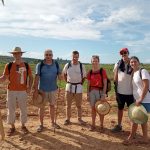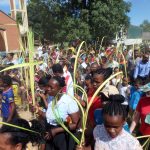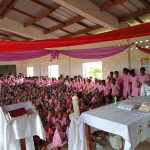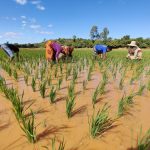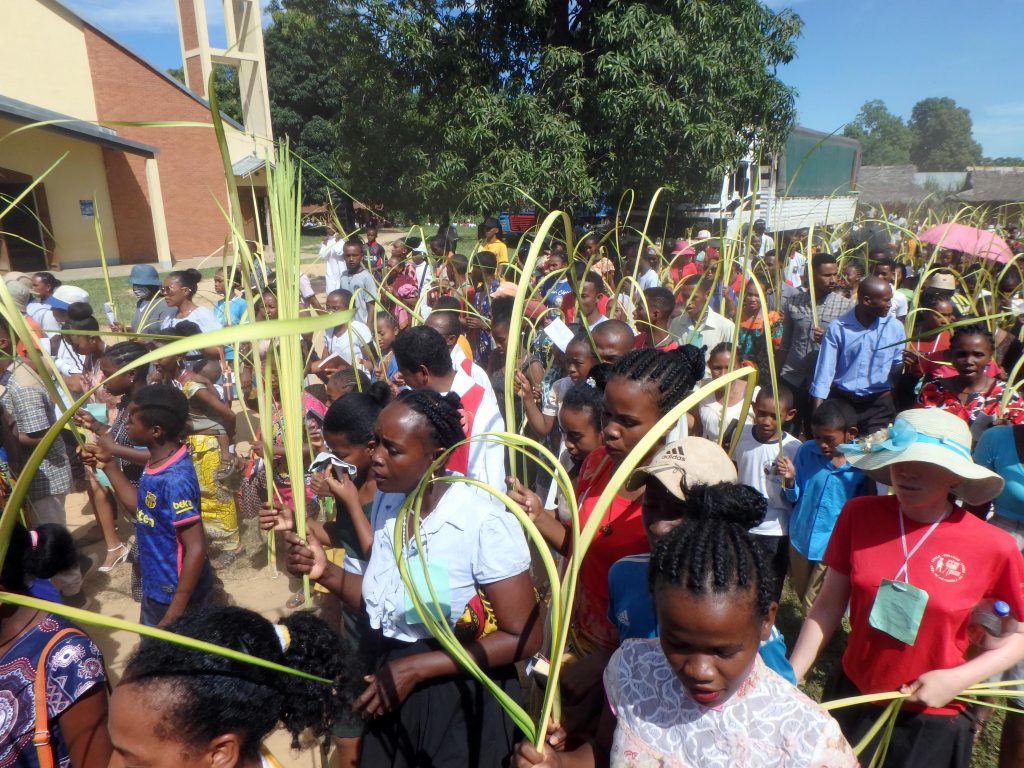
Fête des Rameaux à Tsarahasina.
Madagascar hasn’t made the headlines this year, but life continues here, at a little distance from the modern world. The western world’s desire for cars with lots of electronics is an absolute nightmare for us. Where can we find some simple cars without electronics that can keep us moving in all weathers? Mind you, we do dream of drone vehicles that could fly over the roads!
The population of Madagascar has been growing by 850 000 people a year and has now reached 28 million. The population is doubling every 25 years. A proportion of those lucky enough to get higher education go abroad looking for a better life. Students who complete their studies, nurses, midwives, teachers or others, find they are unable to find work and return to their villages where they cultivate the land and, sometimes, are able to put their studies to use. The country progresses at local speed. But money is coming into the country to build wonderful football stadiums and also, perhaps, one day, to recruit footballers to play in European competitions.
A Church that takes care of the young
The Church operates like the country but, at the same time, it gives hope to young people through its thousands of schools and through its youth activities. It accompanies young people who grow very quicklyhere, far from the traditional reference points of their parents, connected to social media, without having the means to analyse the information they provide.
Before leaving Madagascar, the Apostolic Nuncio appointed one bishop and moved another one to two northern dioceses. This had been on hold for four years. Four dioceses are still waiting for a bishop. Time passes at a different speed in Rome and Madagascar. We have just welcomed a new Nuncio of Polish origin, he will have much work to do to accompany the Malagasy Church.
On 2 October I went east to Tamatave for the inauguration of a new philosophy seminary built by Father Thomas MEP. There are still many seminarians in Madagascar, particularly on the plateaus. We are also planning to build a theological seminary in Mahajanga to accommodate seminarians from the four dioceses in the north of the island. The Tananarive seminary is full.
The construction of the Port-Bergé diocese is continuing
In our Port-Bergé diocese, things are progressing thanks to the fourteen diocesan priests and the nineteen religious priests who work in eleven sectors, helped by fifteen communities of nuns who work in schools or inhealth. The diocese is making great efforts to educate children. Apart from schools, there are no other possibilities for development. In twenty years, we have built more than two hundred classrooms and there is still a shortage. People have confidence in Catholic education. In the schools, the sisters do a wonderful job of working closely with, and supporting, families. Families must make a contribution, but they do not regret it, even if it means they have to make some effort. In some establishments, we schedule meetings to train parents in their duties and responsibilities.
Each year, we also build churches, in towns or in the countryside. Their size depends on the size of the local community. But, over time, I have found that the first churches that were built are now too small. Oneexample near Tsarahasina: in 2015, in a village of about eight hundred inhabitants, we built a small church with cob walls and a sheet metal roof for ten people. It was 4 x 7 metres. It was fine. But, last December, we noticed that in this community, which we visit twice a year, more than one hundred people congregate on Sundays. So we need to build a new, larger church. This phenomenon is repeated in several villages. We can only rejoice in this, taking up the challenge of finding the money and more sites in the diocese in order to build new churches.
The challenge of health
In terms of health, following the opening of the Héloïse dispensary in Tsarahasina in 2015, we are going to open a dispensary in Ankiririky, also in the parish of Tsarahasina, at the beginning of the year. Nuns will take responsibility for its running.
In Port-Bergé, we have built a health centre providing consultations, vaccinations, prenatal services, a delivery room and a testing laboratory. A new religious congregation has arrived in the diocese to take responsibility for this. We hope to open the first part in the coming weeks.
Health is a big challenge because people often arrive late at the health centres, after first having consulted the local shaman…
I would also like to use this health centre to provide continuous professional development for nurses and midwives who are beginning to work in the villages. They are often isolated and not connected to the public health system. Unable to live from their trades, they also have to cultivate land in parallel. Support for themwill significantly reduce disease in the villages.
We continue to help the mothers of children who have club feet or bow legs by sending them to Antananarivo, to a centre run by nuns. The first child I had treated was already 10 years old and had to undergo three operations. His name is Michel Platini. He had two club feet. You can’t make this up – he plays football now!
Christian communities to serve
In the Tsarahasina mission, life goes on, with more and more work to support the thirty-five Christian communities. I thought I had finished building churches, but now, in five remote villages, people have founded Christian communities and now they are asking for churches so that they can meet on Sundays. Catechists are undergoing training to manage these new communities.
In addition, I am still doing regular tours in the bush, often on foot, to visit Christians and schools. Having built eleven primary schools and three colleges, in September we will be opening a new college in Amparihibe. There are always unplanned projects to be implemented, but they are necessary to meet local needs. Currently on the mission we are educating 1 850 children, spread over eleven schools. This is a real challenge that requires a daily commitment from everyone.
For a year now, during the rainy season, motor boats have been travelling to a village. We go upriver, travel along a canal and then we cross a large lake. It makes our life easier, saving us from having to wadethrough mud for many miles. It’s some small progress in the area.
On the mission, we have two communities of nuns, one in Tsarahasina, made up of five nuns, and one in Ankiririky, with three nuns. They are all busy, working in schools, clinics and pastoral care.
The parish has about 80 000 inhabitants, of whom 2 500 meet to pray on Sundays in one of the thirty-five Catholic communities. 360 of them can receive communion and about forty-two have been married in the Church. As in the wider society, Church members are very young and we can only continue to grow.
We continue to welcome MEP volunteers. They stay from nine months to a year and do extraordinary work in schools, clinics or on building sites. They bring us their questions and their presence, which encouragesus to always keep our hearts open and to think more deeply about what we are doing.
Thank you for your support
This year, I spent three and a half months in France. I would like to say a big thank you to those I was able to meet again, it was a great joy. I would also like to thank, from the bottom of my heart, all those who support us in the mission through their prayers or by sending money, which makes it possible for us to continue with construction and to help sick children or students after the baccalaureate.
With these few pieces of news, I send my wishes for you to walk with Jesus, who does not disappoint those who trust in him. The Church sometimes hits the headlines with some drama, but we must not forget all the people who work quietly and with dedication to bear witness to God’s love for the men and women of today. The adventure that began two thousand years ago continues now with trust and faith in the Risen One.
Fr Bertrand de Bourran, MEP
- Le Père Bertrand de Bourran avec les volontaires de retour de brousse.
- Fête des Rameaux à Tsarahasina.
- Messe des enfants de l’école Ankiririky.
- Rizières de Madagascar.
